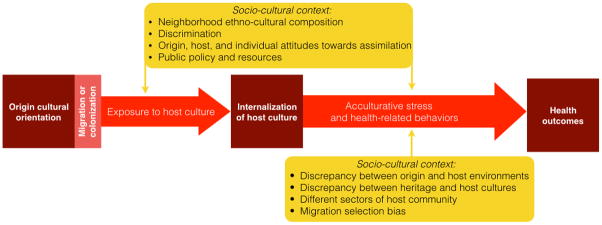Figure 3.
Diagram of how acculturation can influence health. A minority-culture individual’s exposure to the majority (“host”) culture may lead to the individual’s internalization of the host group’s cultural orientation. Host cultural orientation (and the process of adoption of host cultural orientation) may induce psychosocial stress and/or promote adoption of unhealthy behaviors, and thereby negatively affect the individual’s health. Both of these processes (the extent to which exposure to host culture leads to internalization of host culture; the extent to which acculturation causes stress and unhealthy behavior) are potentially modified by sociocultural context. In other words, firstly, the relationship between exposure and adoption of host culture may be moderated by sociocultural context, and secondly, the relationship between acculturation and stress/unhealthy behavior may be moderated by sociocultural context. We emphasize eight aspects of sociocultural context: (1) neighborhood ethnocultural composition; (2) discrimination; (3) discrepancy between origin and host environments; (4) discrepancy between heritage and host cultures; (5) origin group, host group, and individual attitudes towards assimilation; (6) variation in targets of assimilation within host community; (7) public policy and resources; (8) migration selection bias.

